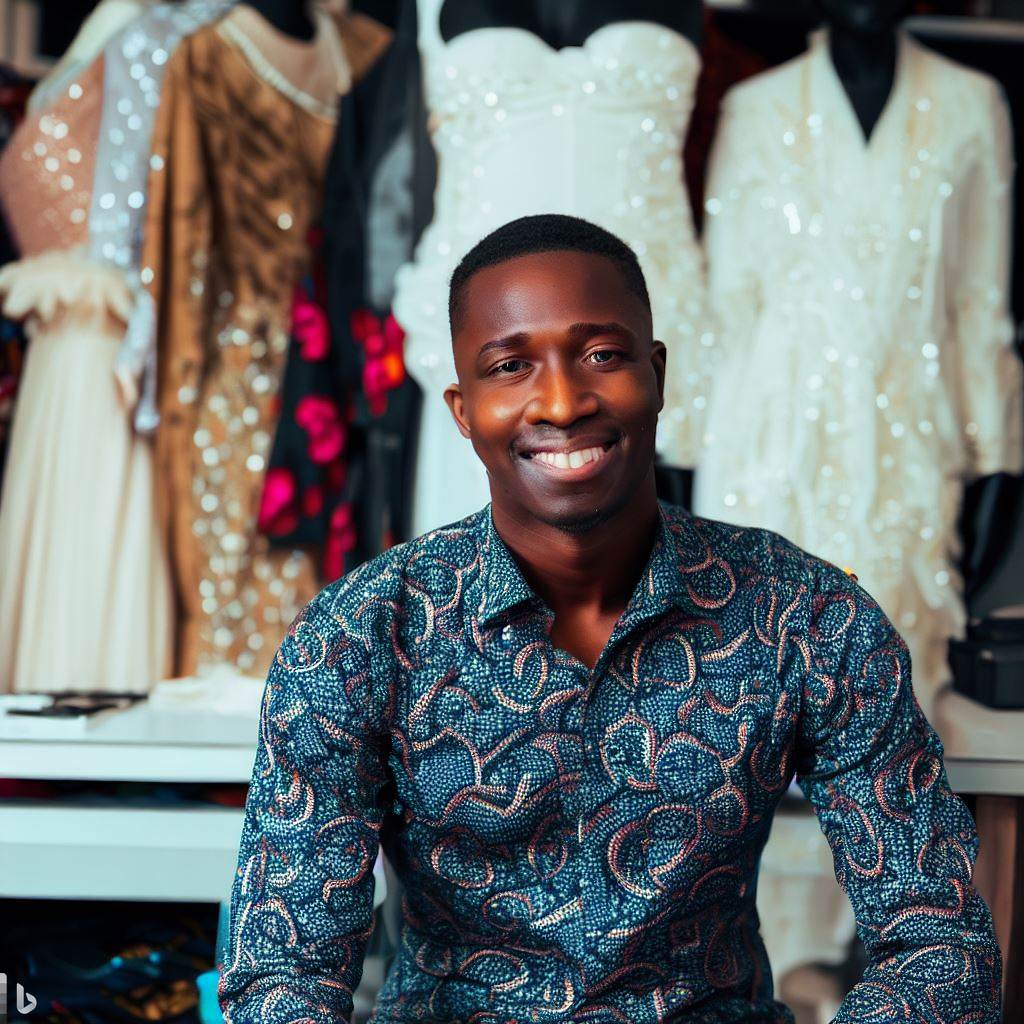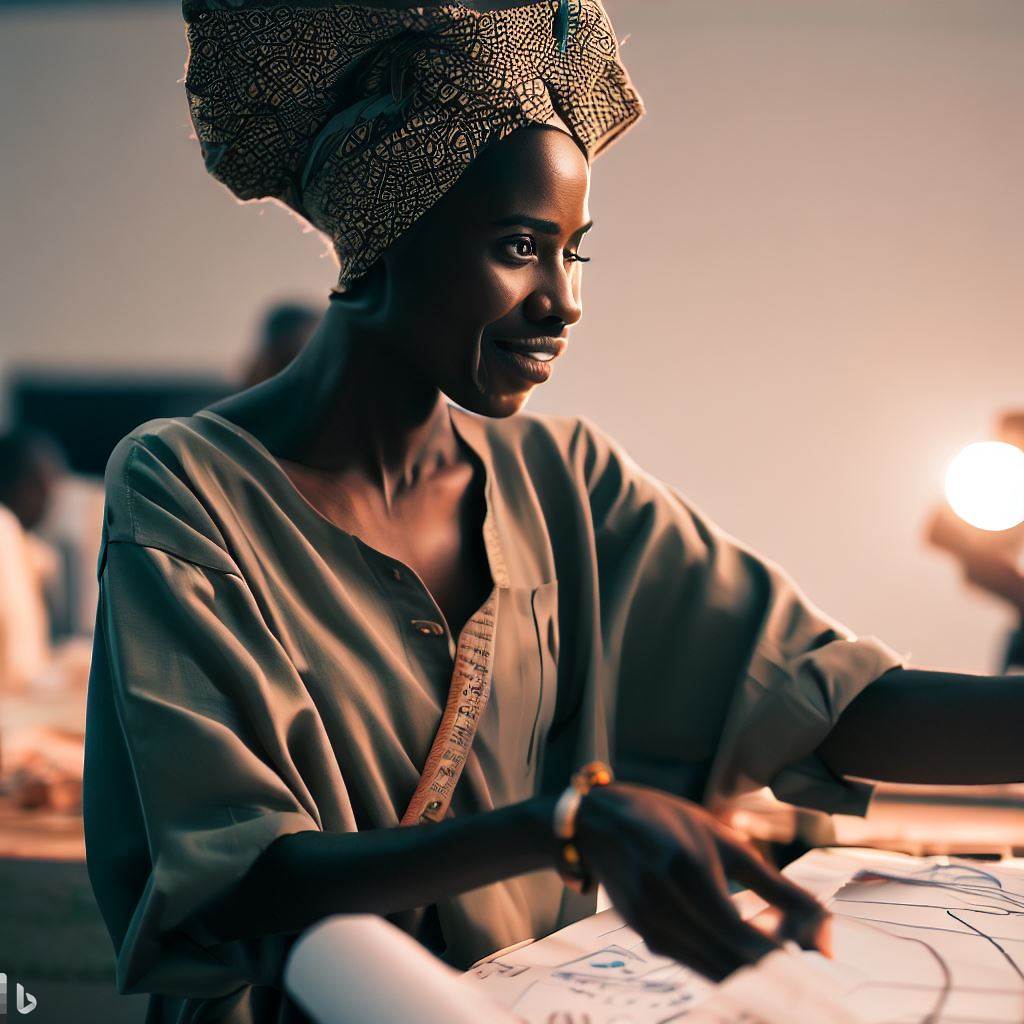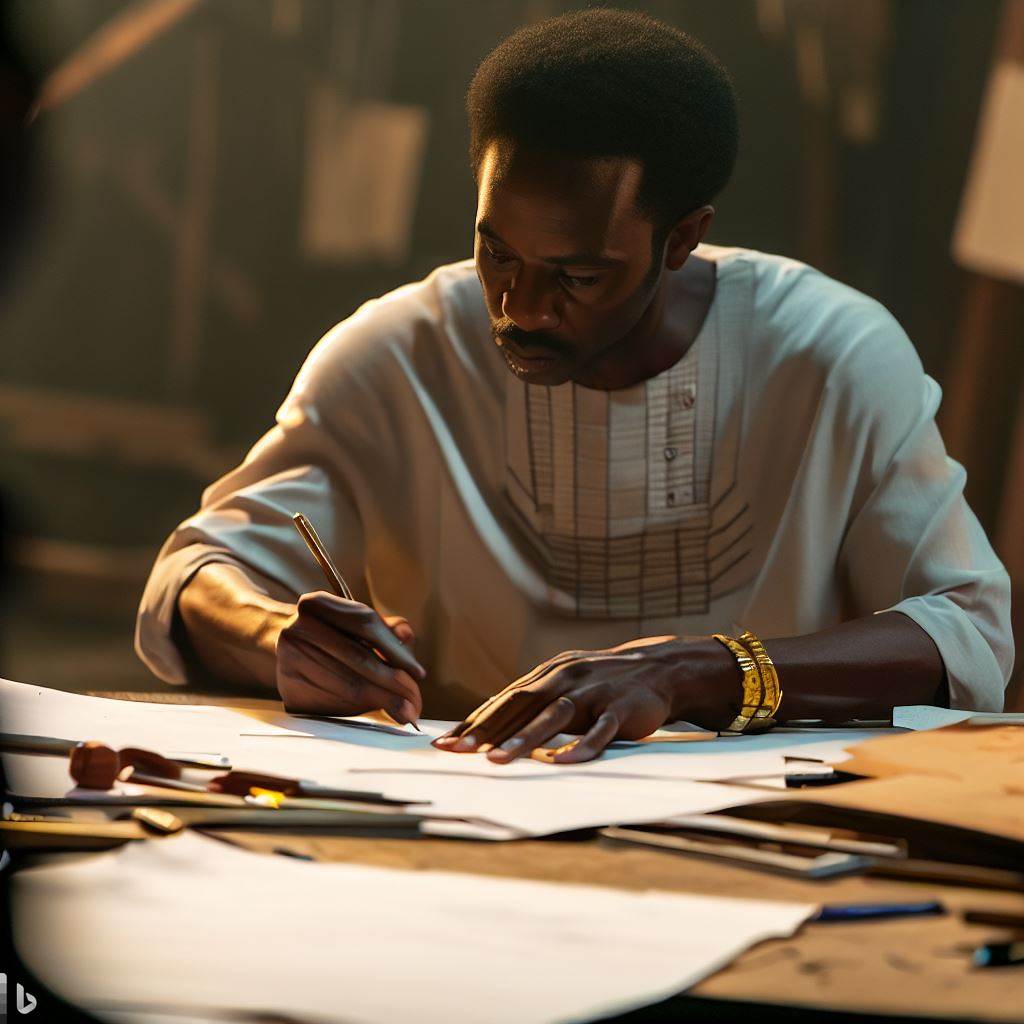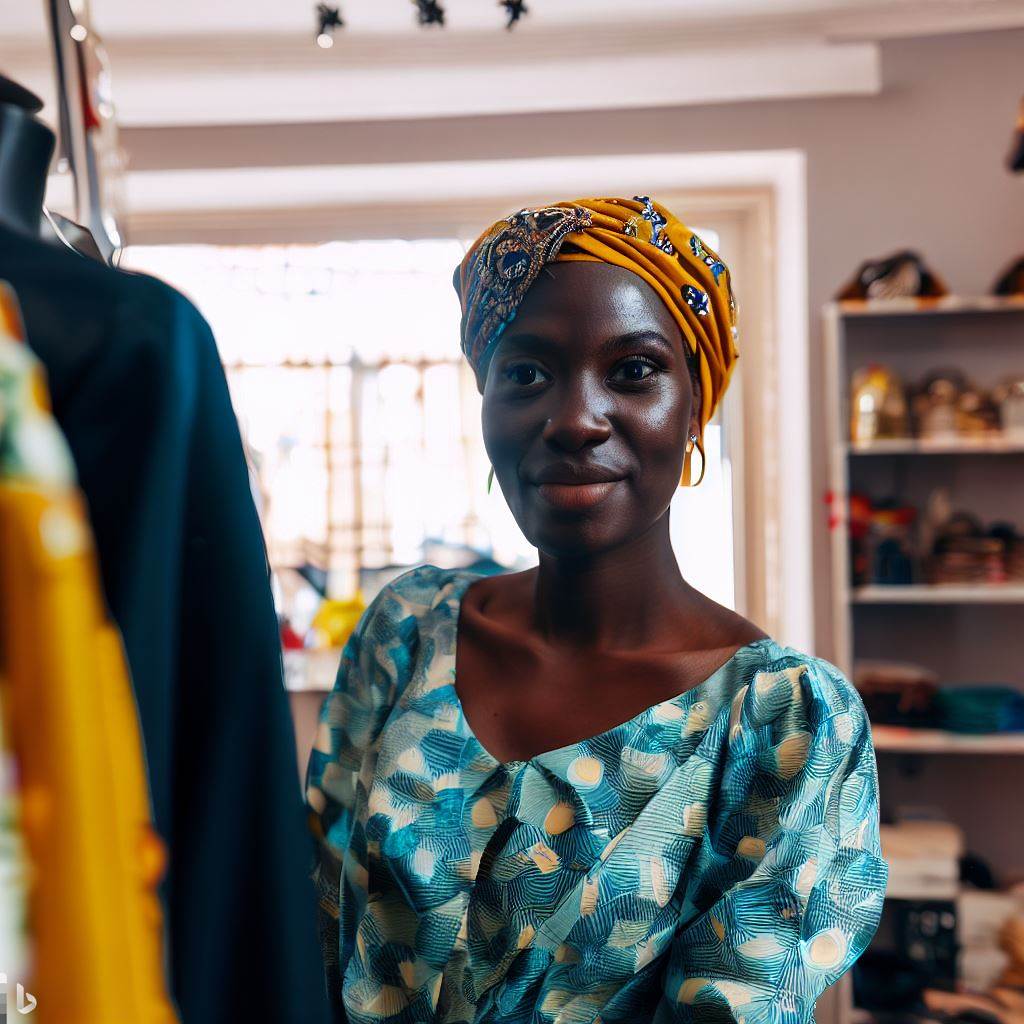Introduction
Fashion Design in Nigeria is a thriving and dynamic industry with vast potential. In recent years, it has experienced remarkable growth, captivating the world with its unique blend of tradition and innovation.
This blog post aims to serve as a guiding light for budding fashion creatives in Nigeria.
Whether you’re a novice sketching your first designs or an established talent seeking to reach greater heights, this post is designed to provide valuable insights.
The Nigerian fashion scene has evolved from being merely a cultural expression to a booming business sector.
With the rise of homegrown designers like Deola Sagoe, Lisa Folawiyo, and Mai Atafo, Nigeria is gaining recognition on the global fashion stage.
Aspiring fashion designers in Nigeria have an incredible opportunity to tap into this burgeoning industry, but it’s not without its challenges.
To navigate this vibrant yet competitive landscape successfully, you’ll need more than just creativity; you’ll need a roadmap.
In the upcoming sections of this blog, we will delve deep into the world of fashion design in Nigeria.
We will explore the essential skills you should hone, the cultural influences that can shape your designs, and the business acumen required to turn your passion into a sustainable career.
So, whether you’re sketching your first masterpiece or gearing up for a fashion show, keep reading.
Our goal is to equip you with the knowledge and inspiration needed to thrive in the exciting world of Nigerian fashion design.
The Importance of Passion and Creativity
A. Significance of having a genuine passion for fashion design
Passion is the driving force that fuels dedication and perseverance in the fashion design industry.
Having a true passion for fashion allows designers to overcome obstacles and stay motivated.
A genuine passion for fashion design ensures that the work produced is authentic and of high quality.
Passion also helps designers find their unique voice and style in a competitive market.
Without passion, fashion design can become mundane, leading to burnout and lackluster designs.
B. The role of creativity in standing out in the competitive industry
Creativity is essential for fashion designers to differentiate themselves from others in the industry.
Originality is highly valued in the fashion world, and creativity allows designers to express their unique perspectives.
Designers who think outside the box and push boundaries have a better chance of capturing people’s attention.
Creative design solutions set designers apart and create a memorable brand identity.
In a competitive industry, creativity helps designers create innovative designs that captivate and excite consumers.
C. Stories of successful Nigerian fashion designers who started with passion and creativity
Deola Sagoe, a renowned Nigerian fashion designer, started her career with a passion for promoting Nigerian culture through fashion.
Mai Atafo, another successful Nigerian designer, began designing clothes out of his love for dressing well.
Ituen Basi, known for her vibrant and bold designs, started her brand fueled by a passion for celebrating African fabrics.
These designers’ passion and creative vision have allowed them to succeed and become influential figures in the industry.
They serve as inspirations for aspiring Nigerian fashion designers looking to make their mark with their own creativity and passion.
Basically, having a genuine passion for fashion design is crucial as it drives dedication, authenticity, and uniqueness.
Creativity plays an equally important role, helping designers stand out and create innovative designs.
Nigerian fashion designers, such as Deola Sagoe, Mai Atafo, and Ituen Basi, demonstrate the power of passion and creativity in achieving success.
Aspiring creatives can learn from their stories and strive to nurture their own passion and develop their unique creative voice within the competitive industry.
Read: Fashion Design in Nigeria: A Guide to Finding a Job
Developing a Solid Foundation
Gaining knowledge and skills in fashion design is crucial for aspiring creatives in Nigeria.
It is essential to have a solid foundation in order to succeed in the competitive fashion industry.
Here are some tips on how to develop that foundation.
A. Importance of Gaining Knowledge and Skills in Fashion Design
- Acquiring knowledge and skills in fashion design helps aspiring creatives understand the principles and techniques of the craft.
- It allows designers to effectively express their creativity and bring their ideas to life.
- Knowledge of fashion design enables designers to create innovative and unique pieces that stand out in the industry.
- Developing skills in areas like pattern making and sewing enhances designers’ ability to produce high-quality garments.
- Understanding fashion history and trends helps designers create collections that resonate with their target audience.
- Gaining knowledge in fashion business and marketing is vital for the success of aspiring designers’ brands.
B. Various Options for Formal Fashion Education in Nigeria
Many educational institutions in Nigeria offer formal fashion design programs, providing aspiring designers with the opportunity to learn from industry professionals.
Fashion design courses can be pursued at universities, polytechnics, and specialized fashion schools across the country.
These programs cover a wide range of subjects such as fashion illustration, garment construction, textile design, and fashion marketing.
Formal education in fashion design provides students with a comprehensive understanding of the industry and prepares them for the challenges they may encounter.
Some notable fashion schools in Nigeria include the Fashion Designers Association of Nigeria (FADAN) School of Fashion, the Creative Art Academy, and the Pearl Academy of Fashion.
C. Tips on Self-Learning and Staying Updated with Industry Trends
- In addition to formal education, self-learning plays a significant role in developing a solid foundation in fashion design.
- Aspiring designers can learn from online resources, books, tutorials, and fashion magazines to expand their knowledge and skills.
- Experimenting with different fabrics, patterns, and styles can help designers develop their unique aesthetic.
- Attending fashion workshops, seminars, and fashion weeks allows designers to stay updated with the latest industry trends and network with professionals.
- Building a strong online presence through social media platforms and personal websites helps aspiring designers showcase their work to a broader audience.
Generally, gaining knowledge and skills in fashion design is of utmost importance for aspiring creatives in Nigeria.
With the various options for formal fashion education and the availability of self-learning resources, there are ample opportunities to develop a solid foundation in the industry.
It is essential to continuously update oneself with industry trends and remain dedicated to honing skills in order to succeed in the competitive world of fashion design.
Read: The Role of Culture in Nigerian Fashion Design Industry
Building a Strong Portfolio
Having a visually appealing portfolio is essential for aspiring fashion designers in Nigeria.
A. The need for a visually appealing portfolio to showcase one’s designs
It serves as a showcase of their talent, skills, and creative abilities.
Curating a portfolio that demonstrates versatility and creativity is crucial.
It should include a variety of designs, ranging from different styles, themes, and techniques.
B. How to curate a portfolio that demonstrates versatility and creativity
Start by selecting your best work and organizing them in a way that presents a cohesive narrative. Make sure to include a mix of sketches, illustrations, photographs, and digital designs.
Consider including both completed pieces and works in progress. This allows potential clients or employers to see your creative process and development as a designer.
Incorporate different forms of media to make your portfolio stand out. Add videos or animations showcasing your designs in motion, giving viewers a comprehensive look at your creations.
Knowing your target audience is crucial when curating a portfolio. Tailor your selection of designs to appeal to the specific market you wish to target, whether it’s high fashion, streetwear, or traditional clothing.
C. Role of social media platforms in showcasing and promoting one’s work
When using social media platforms to showcase and promote your work, choose the ones that are popular among your target audience.
Platforms like Instagram and Pinterest are widely used by fashion lovers.
Optimize your social media profiles by using high-quality images and well-written captions that describe your designs and creative process.
Engage with your audience by responding to comments and messages promptly.
You can also leverage social media to collaborate with other creative individuals or brands, expanding your reach and exposure.
Networking is key in the fashion industry.
Regularly update your portfolio to reflect your growth and latest designs.
This shows potential clients or employers that you are actively working and improving your craft.
Consider investing in a professional website to showcase your portfolio.
A website allows you to have complete control over the presentation of your work and can create a more professional impression.
Ensure that your website is mobile-friendly, as many people access the internet through their smartphones.
Make it easy for visitors to navigate and view your designs on any device.
Finally, when curating your portfolio, remember to emphasize your unique selling points as a fashion designer.
What sets you apart from others? Highlight your strengths and showcase your signature style.
Essentially, building a strong portfolio is crucial for aspiring fashion designers in Nigeria.
It provides a visually appealing showcase of their designs and allows them to demonstrate their versatility and creativity.
Utilizing social media platforms and creating a professional website are effective ways to showcase and promote one’s work.
By curating a standout portfolio, aspiring creatives can increase their chances of success in the fashion industry.
Read: Education for Fashion Designers in Nigeria: What You Need
Networking and Collaboration
Building relationships with industry professionals is crucial for aspiring fashion creatives in Nigeria.
It not only enhances their exposure but also opens doors for potential collaborations and growth opportunities.
A. Significance of building relationships with industry professionals
- Connect with fashion influencers and designers to gain insights and industry knowledge.
- Seek mentorship from experienced professionals who can guide you in your fashion journey.
- Collaborate with established fashion brands to expand your network and access wider audiences.
- Build credibility by associating yourself with reputable names in the fashion industry.
B. Tips on attending fashion-related events and networking opportunities
- Research and identify relevant fashion events, trade shows, and conferences in Nigeria.
- Prepare a well-designed portfolio or lookbook to showcase your work to potential contacts.
- Dress professionally and maintain a confident and approachable attitude.
- Engage in meaningful conversations, ask questions, and show genuine interest in others.
- Follow up with contacts after the event through personalized emails or social media connections.
C. Benefits of collaborating with other creatives and professionals in the field
- Collaborating allows you to combine unique skills and perspectives for innovative projects.
- It provides an opportunity to learn from others, expand your creative horizons, and acquire new techniques.
- Collaborative projects help in sharing costs, resources, and workload.
- Working with professionals from different areas of expertise strengthens your network and broadens your audience.
- Collaborations can lead to increased exposure, brand recognition, and potential business partnerships.
Networking and collaboration are essential for aspiring fashion creatives in Nigeria aspiring to make a mark in the industry.
By building relationships with industry professionals, attending fashion-related events, and collaborating with other creatives, these individuals can gain valuable insights, expand their network, and open doors to exciting opportunities.
Read: How to Start a Fashion Design Business in Nigeria

Finding a Niche and Defining a Style
When it comes to fashion design in Nigeria, aspiring creatives must understand the importance of finding a unique niche and establishing a personal style.
In a highly competitive industry, having a distinguishable identity is crucial for success.
A. Importance of finding a unique niche and establishing a personal style
- Start by exploring your interests and passions to identify a niche that sets you apart from others.
- Research the current fashion trends in Nigeria and globally to understand the market demands.
- Experiment with different styles and techniques to discover what best represents your creative vision.
- Build a strong foundation in design fundamentals to showcase your skills and expertise.
- Network with industry professionals and mentors who can provide guidance and support along your fashion journey.
B. Relevance of incorporating Nigerian culture and heritage in designs
Nigeria’s rich culture and heritage serve as a valuable source of inspiration for fashion designers.
Incorporating traditional elements in designs not only adds uniqueness but also promotes cultural preservation.
- Study Nigerian traditional clothing, textiles, and craftsmanship to infuse authentic elements into your designs.
- Find innovative ways to blend traditional aesthetics with modern fashion trends to appeal to a broader audience.
- Celebrate Nigerian diversity by incorporating different cultural influences from various regions of the country.
- Collaborate with local artisans to create handcrafted pieces that showcase the beauty of Nigerian craftsmanship.
- Use fashion as a platform to tell stories and highlight the cultural significance behind each design.
- Provide tips on staying true to one’s vision while catering to market demands
C. Tips on staying true to one’s vision while catering to market demands
While it is essential to understand market demands, aspiring fashion designers should also prioritize staying true to their unique vision.
Balancing creativity and commercial viability can be challenging but not impossible.
- Believe in your creative vision and trust your instincts when making design decisions.
- Seek feedback from trusted mentors and industry professionals to gain different perspectives without compromising your style.
- Do market research regularly to identify gaps and opportunities that align with your design philosophy.
- Continuously innovate to stay ahead of trends and differentiate yourself from competitors.
- Build a brand that resonates with your target audience and consistently communicates your design philosophy.
In general, finding a niche and defining a personal style are essential steps for aspiring fashion designers in Nigeria. Incorporating Nigerian culture and heritage adds uniqueness to designs.
Balancing personal vision with market demands is crucial for long-term success.
With dedication, perseverance, and continuous learning, aspiring creatives can thrive in Nigeria’s vibrant fashion industry.
Navigating the Business Side of Fashion Design
Running a successful fashion design business in Nigeria requires an understanding of various aspects.
From pricing and sourcing materials to marketing strategies and protecting intellectual property, aspiring creatives need to navigate the business side of fashion design effectively.
A. Pricing Strategies
- Determine your costs, including materials, labor, and overhead expenses.
- Research the market to understand pricing trends and competitors’ rates.
- Consider the value you are providing and the perceived quality of your designs.
- Set prices that cover your expenses and allow for a reasonable profit margin.
- Regularly review and adjust your pricing strategy based on market demands and business growth.
B. Sourcing Materials
- Identify reliable suppliers and build strong relationships with them.
- Ensure the quality of materials aligns with your brand and customers’ expectations.
- Negotiate favorable terms and discounts for bulk purchases.
- Diversify your suppliers to avoid disruptions in the supply chain.
- Stay updated with the latest trends in sustainable and ethically sourced materials.
C. Marketing Strategies
- Develop a strong brand identity that reflects your unique fashion designs.
- Create an online presence through a website and social media platforms.
- Utilize influencer partnerships and collaborations to reach a wider audience.
- Invest in professional photography to showcase your designs effectively.
- Engage with your customers through promotions, events, and personalized experiences.
D. Protecting Intellectual Property and Trademarks
- Register your fashion designs with appropriate intellectual property authorities.
- Consult legal professionals to understand copyright and trademark laws.
- Trademark your brand name, logo, and any unique design elements.
- Protect your digital assets by implementing robust cybersecurity measures.
- Monitor the market for counterfeit products and take appropriate legal actions.
In essence, aspiring fashion designers in Nigeria need to become proficient in the business side of fashion design.
Publish Your Professional Profile, Business or Brand
Showcase your expertise, gain trust, and boost visibility instantly on Professions.ng.
Publish NowSuccessful navigation involves implementing effective pricing strategies, sourcing high-quality materials, crafting impactful marketing campaigns, and protecting their intellectual property and trademarks.
By considering these aspects, creatives can enhance their chances of building a thriving fashion design business.
Overcoming Challenges and Staying Motivated
In the competitive world of fashion design in Nigeria, aspiring creatives often face unique challenges.
However, with the right mindset and strategies, they can overcome obstacles and stay motivated on their journey towards success.
Here are some common challenges faced by aspiring fashion designers in Nigeria and tips on staying motivated:
A. Identify Common Challenges Faced by Aspiring Fashion Designers in Nigeria
- Limited access to resources and funding: Many aspiring fashion designers in Nigeria struggle to find the financial support and resources necessary to bring their designs to life.
- Inadequate infrastructure and equipment: The lack of proper sewing machines, fabric cutting tools, and workspaces can hinder the progress of Nigerian fashion designers.
- Fierce competition: The Nigerian fashion industry is highly competitive, making it challenging for newcomers to establish their brand and gain recognition.
- Cultural biases and stereotypes: Traditional norms and expectations can discourage aspiring fashion designers from exploring innovative ideas and unique styles.
- Inconsistent electricity supply: Frequent power outages can disrupt work schedules and hinder the production process.
B. Tips on Staying Motivated and Resilient Despite Challenges
- Set clear goals and objectives: Define what you want to achieve as a fashion designer and create a roadmap to navigate challenges.
- Build a support network: Surround yourself with like-minded individuals who can provide guidance, feedback, and motivation during challenging times.
- Stay informed and updated: Keep up with the latest fashion trends, industry news, and technological advancements to stay relevant and competitive.
- Embrace collaboration and partnerships: Collaborate with other fashion designers, artisans, fabric suppliers, and influencers to expand your network and reach a wider audience.
- Seek mentorship: Find experienced fashion designers who can offer guidance, share their experiences, and provide valuable advice.
C. Success Stories of Nigerian Fashion Designers who Overcame Obstacles
Despite the challenges, several Nigerian fashion designers have achieved remarkable success through their determination and resilience:
- Deola Sagoe: Overcame the limited access to resources and funding by incorporating traditional African fabrics and techniques into her designs, gaining international recognition.
- Mai Atafo: Despite the fierce competition, Mai Atafo established a strong brand by focusing on bespoke tailoring and attracting high-profile clientele.
- Lisa Folawiyo: Successfully challenged cultural biases and stereotypes by blending traditional African prints with contemporary designs, gaining global acclaim.
- Amaka Osakwe: Overcame inadequate infrastructure and equipment to establish the brand, Maki Oh, known for its exquisite handmade and embellished garments.
- Tiffany Amber: Despite inconsistent electricity supply, the brand Tiffany Amber became a household name by creating timeless and elegant designs.
These success stories serve as inspiration and proof that aspiring fashion designers in Nigeria can overcome challenges and achieve their dreams with persistence and creativity.
Learn More: Nigeria’s Interior Design Market: Opportunities and Challenges
Conclusion
This blog post has provided valuable tips for aspiring fashion designers in Nigeria.
We discussed the importance of developing a unique style, staying updated on industry trends, and networking with industry professionals.
It is important for aspiring creatives to pursue their dreams and contribute to the Nigerian fashion industry.
With determination and perseverance, they can make a significant impact and create innovative designs that showcase the beauty and heritage of Nigeria.
Therefore, I encourage aspiring fashion designers to take action and share their portfolios, reach out for collaborations with fellow designers and industry experts, or seek mentorship to refine their skills.
By actively engaging in the fashion community, individuals can gain valuable experience and exposure, which can propel their careers to new heights.
Remember, the Nigerian fashion industry is full of potential and opportunities – it is up to aspiring creatives to seize them and make their mark.
The future of Nigerian fashion rests in the hands of passionate and talented individuals, and by pursuing their dreams, they can play a vital role in shaping the industry’s growth and success.




